Rethinking Mexican Indigenismo
The INI's Coordinating Center in Highland Chiapas and the Fate of a Utopian Project
Format:Paperback
Publisher:University of New Mexico Press
Published:30th May '20
Currently unavailable, and unfortunately no date known when it will be back

Honorable Mention for the 2019 Thomas McGann Book Prize from the Rocky Mountain Council for Latin American Studies
Mexico's National Indigenist Institute (INI) was at the vanguard of hemispheric indigenismo from 1951 through the mid-1970s, thanks to the innovative development projects that were first introduced at its pilot Tseltal-Tsotsil Coordinating Center in highland Chiapas. This book traces how indigenista innovation gave way to stagnation as local opposition, shifting national priorities, and waning financial support took their toll. After 1970 indigenismo may have served the populist aims of President Luis Echeverría, but Mexican anthropologists, indigenistas, and indigenous people themselves increasingly challenged INI theory and practice and rendered them obsolete.
Well written and clearly argued, this book analyzes the outcomes of a generation of government policy vis-à-vis indigenous peoples in Chiapas. . . . It is a superior contribution to the field in part because of its scope and in part because of its detail." - Alexander S. Dawson, author of Indian and Nation in Revolutionary Mexico
"Steve Lewis expertly provides us with a magnificent tour-de-force of indigenista policy initiatives designed to improve the life of the Maya in Chiapas, Mexico's most backward state. This book is required reading to understand the potential and contradictions of government-centered development programs, as well as the personalities of those who design such policies." - Marc Becker, author of Pachakutik: Indigenous Movements and Electoral Politics in Ecuador
ISBN: 9780826361516
Dimensions: unknown
Weight: 505g
360 pages